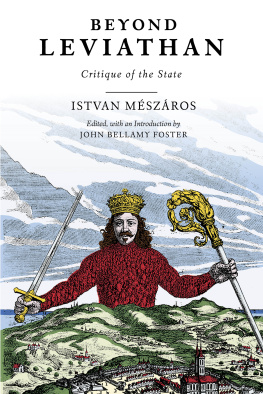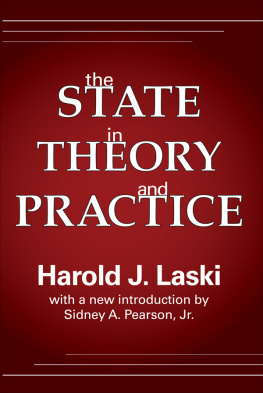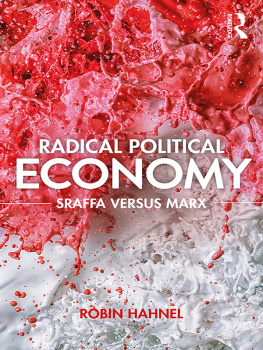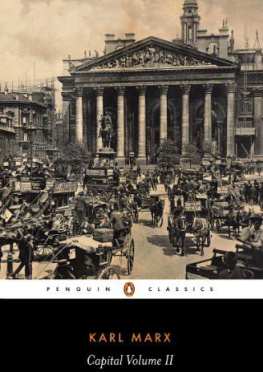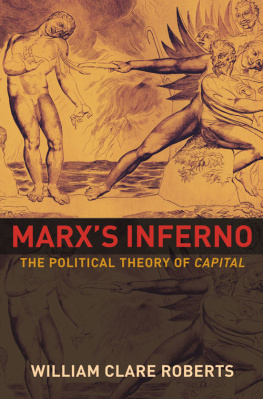Contents
Page List
Guide

BEYOND LEVIATHAN
BEYOND LEVIATHAN
Critique of the State
____________
by ISTVN MSZROS
Edited, with an Introduction and Notes, by
JOHN BELLAMY FOSTER

Copyright 2022 by George Mszros
All Rights Reserved
Library of Congress Cataloging-in-Publication Data available from the publisher.
ISBN paper: 978-1-58367-949-4
ISBN cloth: 978-1-58367-950-0
Typeset in Bulmer MT Std
MONTHLY REVIEW PRESS, NEW YORK
monthlyreview.org
5 4 3 2 1
Contents
by John Bellamy Foster
PART ONE
FROM RELATIVE TO ABSOLUTE LIMITS: HISTORICAL ANACHRONISM OF THE STATE
PART TWO
THE MOUNTAIN WE MUST CONQUER: REFLECTIONS ON THE STATE
PART THREE
ANCIENT AND MODERN UTOPIAS
Introduction
ON SEPTEMBER 19, 2012, ISTVN MSZROS WROTE TO ME, There is one more book I would very much like to write, and I am working on it as much as my strength permits. This is, as you know, my long-standing project on the state of which some partial results have been incorporated into my books, including Beyond Capital and Social Structure and Forms of Consciousness. Probably six to nine months will be still dedicated to the strictly preparatory stage, but I hope that in July next year when you come to England I can show you something.
Beyond Leviathan was originally projected as a work of 600 to 700 pages., The Historic Challenge, was nearly completed when Mszros died, following a stroke, on October 1, 2017. It is this volume that is being published here under the title of the entire work. The earlier second-version draft manuscript, mainly consisting of materials that were originally to be the basis for the second and third volumes of Beyond Leviathan, is to be published subsequently, in a single volume, to be entitled Critique of Leviathan: Reflections on the State. Together, these works, along with relevant sections of his previous books, constitute his entire systematic critique of the state, one of the great contributions in the history of political theory.
Mszross plan to write a major work on the state had its origins several decades prior to the last five years of his life, in which he was primarily concerned with that project. In 1970, with the completion of Marxs Theory of Alienation, which won the Isaac Deutscher Memorial Prize, he began to focus on what he called the structural crisis of capital, articulated in his Deutscher Lecture, The Necessity of Social Control, in January 1971, and in the preface to the third edition of Marxs Theory of Alienation that year.
Beyond Capital was, as its title and subtitle indicated, a theory of the necessity of transcending the capital relation, a critique directed at both contemporary capitalist and at post-revolutionary societies of the Soviet type. Yet, transcending capital necessarily involved, in Mszross perspective, transcending the threefold modalities of capital, labor, and the state. His overall project was thus necessarily extended even at that stage to the critique of the state and to the question, integral to Marxs perspective, of How Could the State Wither Away? In addition, Beyond Capital explored the questions of The Historical Actuality of the Socialist Offensive and The Communal System, both of which concerned the state.
Once Beyond Capital was completed, Mszros was able to return to the task of finishing Social Structure and Forms of Consciousness, which he accomplished while completing a number of smaller works evolving out of his economic and political commitments, including Socialism or Barbarism in 2001, The Challenge and Burden of Historical Time in 2008 with its analysis of The Alternative to Parliamentarianism, and The Structural Crisis of Capital in 2010. Hence, it was only in 2012 that he began his great work on the critique of the state in earnest.
TOWARD A HISTORICAL THEORY OF THE STATE
In the preface to Beyond Leviathan Mszros points out that All of the major theories of the state have been produced in historical periods of great turmoil, from Plato, Aristotle and Augustine through Machiavelli and Hobbes, all the way to Jean-Jacques Rousseau and G. W. F. Hegel, as well as, of course, to Marx, V. I. Lenin, and their comrades like Rosa Luxemburg and Antonio Gramsci (44). In all the important theories of the state, prior to historical materialism, however, the modern forms of which were written in the ascending phases of bourgeois development, the goal was some kind of corrective adjustmentno matter how radical-seeming in their particular historical contextsof the existing command structure [superimposed] on societal decision-making. This applied also to the great utopian theories of the state. In contrast, the Marxian-inspired approach to the state represented a sharp break with all that had come before, in its insistence on the necessity for the withering away of the stateor the total eradication of the statefrom the modality of social reproduction. This is because it was impossible to go beyond capital (and beyond its basis in alienated labor and class) without also going beyond the state, as a form of expropriation of humanitys overall decision-making process (45). Merely overthrowing the capitalist state was never enough because it could be restored; what was needed was its eradication (144). It was this challenge of developing a full-fledged Critique of the State, exploring the entire history of state theory, in order to delineate the origins, development, and eventual demise of the state as a form of societys inescapable need for an overall command structure, that forms the structure of Beyond Leviathan.
It is crucial to understand how radically Mszross critique of the state, viewed in this way, differs from liberal theories of the state, as well as from more critical/social-democratic approaches struggling to operate within the parameters established by the hegemonic liberal-democratic theory. In this respect, it is significant that Mszross second-version draft manuscript commenced with a response to his close friend the Italian philosopher and liberal socialist Norberto Bobbios Is There a Marxist Theory of the State?
Mszros had great respect for Bobbio and considered him a close friend and a critical thinker (195). At all times liberal theories of the state, in the period of the descending phase of capital, sought to disguise or downplay the reality of class, thereby putting any realistic approach to the state permanently out of reach.
Indeed, Mszros contended that behind the endless disquisitions on the various rights, laws, and institutions of the hegemonic state form was the poverty of the contemporary liberal-democratic conception of the state itself, which was incapable of answering, except in the most circular, ahistorical, contradictory, and self-legitimating ways, the question What Is the State? (20204). In this respect, the great theories of the bourgeois state, developed during the ascending phase of capitalism, most importantly Hobbess Leviathan and Hegels The Philosophy of Right, stood far above all other liberal theories of the state, in their power and profundity (187).
This critique of contemporary liberal approaches to the state was also evident in Mszross response to the work of the distinguished English political theorist Ernest Barker, who, beginning in 1928, occupied the chair in political science (endowed by the Rockefeller Foundation) at the University of Cambridge. Here Mszros focused on Barkers introduction to his translation of Otto Gierkes

